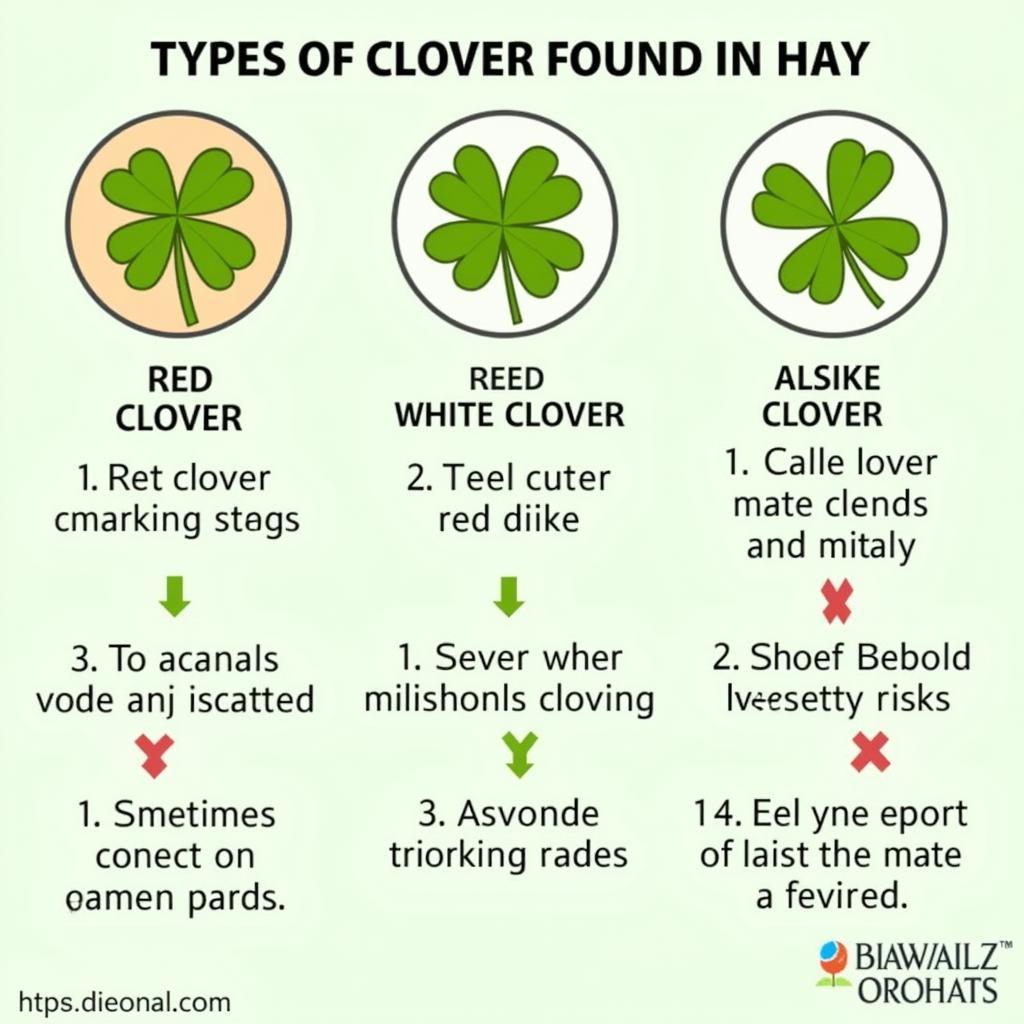Clover in horse hay is a common concern for owners. Knowing whether or not horses can safely consume clover, and under what circumstances, is vital for maintaining their health. This article will explore the benefits and risks of clover in hay, helping you make informed decisions about your horse’s diet.
Understanding Clover in Hay
Clover is a legume often found mixed with grass in hay fields. While it can offer nutritional benefits, it also poses certain risks depending on the type and quantity present. It’s essential to distinguish between different clover varieties, such as red clover, white clover, and alsike clover, as their effects on horses can vary. Understanding these differences is the first step towards ensuring your horse’s well-being.
Benefits of Clover in Hay
Clover, particularly red clover, can be a good source of protein and calcium for horses. This can be particularly beneficial for growing horses, pregnant mares, or lactating mares with increased nutritional needs. Additionally, clover can enhance hay palatability, making it more appealing to picky eaters. is clover hay good for horses explores this in more detail. However, these benefits must be weighed against the potential risks associated with clover consumption.
Is Clover Hay Good for Horses?
Yes, clover hay can be good for horses in moderation. It provides essential nutrients. However, too much clover can be detrimental.
What Types of Clover are Safe?
Red and white clover are generally safe in limited quantities. Alsike clover should be avoided.
How Much Clover is Too Much?
The ideal clover content in hay varies depending on the horse’s individual needs and the type of clover. Consult with a veterinarian or equine nutritionist for personalized advice.
Risks Associated with Clover in Hay
Certain types of clover, especially alsike clover, can pose health risks to horses. Alsike clover contains a toxin that can cause photosensitivity, liver damage, and “big liver syndrome.” is clover bad for horses provides a more in-depth look at these potential issues. Even non-toxic clovers, if present in excessive amounts, can contribute to digestive upset and other health problems.  Types of Clover in Hay Moldy clover hay can also harbor mycotoxins, posing a serious threat to horse health, potentially causing neurological issues or respiratory problems.
Types of Clover in Hay Moldy clover hay can also harbor mycotoxins, posing a serious threat to horse health, potentially causing neurological issues or respiratory problems.
Can Clover Cause Photosensitivity in Horses?
Yes, alsike clover can cause photosensitivity, making horses more susceptible to sunburn and other skin problems.
What are the Signs of Clover Poisoning?
Signs of clover poisoning can include excessive salivation, skin lesions, and neurological symptoms.
How Can I Prevent Clover-Related Issues?
Careful hay selection and monitoring your horse’s intake are key to preventing clover-related health issues.
Choosing and Managing Clover in Hay
When choosing hay for your horses, carefully inspect it for mold and identify the types of clover present. clover hay for horses offers practical advice on selecting appropriate hay. If you’re unsure about the clover content, consider having your hay tested. Introduce clover-containing hay gradually into your horse’s diet to allow their digestive system to adjust. horses beans provides further insights into managing a horse’s dietary needs.
“Knowing your hay is as crucial as knowing your horse. Regularly inspecting your hay for quality and clover content can prevent many health problems,” advises Dr. Emily Carter, DVM, specializing in equine nutrition and internal medicine. She further emphasizes, “Working with a qualified equine nutritionist can help tailor your horse’s diet to meet their specific needs and mitigate any potential risks associated with clover or other forage components.”
Conclusion
Can Horses Eat Clover In Hay? The answer is nuanced. While clover can offer nutritional benefits, it also carries potential risks. By understanding the different types of clover, their effects on horses, and carefully managing their intake, you can ensure your horse benefits from clover without compromising their health. Remember to consult with a veterinarian or equine nutritionist for personalized advice tailored to your horse’s individual needs. blister horse offers further resources on horse health management.
FAQ
- What is the most dangerous type of clover for horses? Alsike clover.
- Can red clover be beneficial for horses? Yes, in moderation.
- How can I tell if my horse is reacting negatively to clover? Look for signs like photosensitivity, excessive salivation, or digestive upset.
- Should I avoid hay with any clover at all? Not necessarily. Red and white clover in moderate amounts are usually safe.
- What should I do if I suspect my horse has clover poisoning? Contact your veterinarian immediately.
- Can I test my hay for clover content? Yes, forage testing labs can analyze the composition of your hay.
- Is it safe to feed horses hay with a high percentage of clover? Generally, no. High clover content can lead to various health issues.
For further assistance, please contact us at Phone: 0772127271, Email: [email protected], or visit our address: QGM2+WX2, Vị Trung, Vị Thuỷ, Hậu Giang, Việt Nam. We have a 24/7 customer service team.